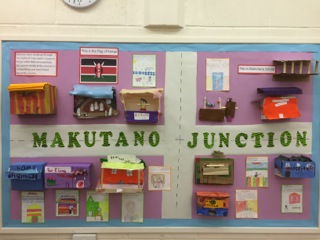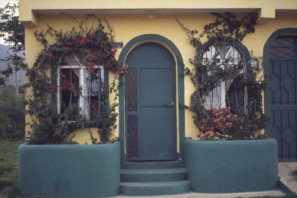Context
Our smaller than average (95 pupils) Primary school is in rural Hampshire. It has a lower than average number of pupils with special needs and pupils taking free school meals. It is predominately white British. This class of 25 consisted of Year 5 and 6 pupils (age 9 to 11). I have been working on bringing Global Citizenship into the curriculum for a while, and have accessed training from my local Development Education Centre. I am keen to introduce what I have learnt further into the school ethos and curriculum. The school did an initial audit, using a wide range of activities with the whole class, mainly focusing on Kenya and pupil attitudes to people living there and on home and community, as this would be the starting point of the follow up work.
First of all, I recorded what they already knew about Kenya.
Pupils’ original ideas about Kenya/Africa
- The pupils have no associations with Kenya or Africa. One child said: I am sure we all have links with Africa in our past. Another believed she might have a second cousin in Africa or Australia.
- Children were excited about the prospect of going on a trip to Africa with the secondary school they feed into, which apparently offers this trip biennially.
- Barack Obama was suggested as a famous Kenyan.
- Pupils wanted to go to Kenya but were discouraged by the heat. It would be too hot, I would faint or get so thirsty that I might die.
- Pupils wanted to go to see the animals but one preferred to visit the Ivory Coast where chocolate comes from. They wanted the world cup to be in Kenya.
Baseline Audit results focusing on Home
Using a variety of pictures of different houses, pupils picked one house to be the best home.
| Comments
on House |
Sustainability/
Ethics/ Environment/ spititual |
Size | Expense | Aesthetics | Related to self, family and community | Debates about House vs Home | Times chosen |
| Tree house | In the wilds | I like to be high up | 2 | ||||
| House with pool | Hot
In sun (2) Spain tranquil |
Big (4) | Posh
luxury |
Outdoor pool (2) | I like to swim (3) | 12 | |
| Large, Indian, pink house | Palms
Near sea (2) |
Big (3)
|
Posh
Luxurious |
Pretty | 6 | ||
| Country/
wooden house |
Wildlife
Fresh air |
Learn new things | 1 | ||||
| Flat | 0 | ||||||
| Boat House | Easy to heat | Save money | 1 | ||||
| Cottage | The others don’t look as homely as this | 2 | |||||
| Den in mud | 0 | ||||||
| House in river | I like rivers | 1 | |||||
| House under the hill | Grow mushrooms on roof
Nice in hills |
2 | |||||
| Total | 14 | 7 | 5 | 3 | 6 | 1 | |
| percentage | 39 | 19 | 14 | 8 | 16 | 3 |
Pupils mainly chose houses purely on size or expense, the large house with the pool being most popular. They considered the setting of the house but not its environmental impact. They talked about places to swim or learn without mentioning friends or family. There was little debate on what makes a house a home and most children were thinking purely about the house. One instance of critical thinking was recorded.
Using The Kenyan soap opera Makutano Junction as a stimulus
Following the audit, these pupils took part in another EU-funded project using the soap opera Makutano Junction as a multimedia approach to global learning. The work uses clips from the first source soap opera and has activities for KS2 pupils to learn about Home and Community, Health, Money, Stereotyping and making good Drama. It also allows pupils to empathise with the characters. After the first lesson on Makutano Junction the pupils said that they had learnt that:
- Kenyans have TVs to watch Makutano Junction on

- They have the same worries as us
- They have the same problems as us
- I don’t like stereotyping but it is hard to stop doing it.
Pupils do not want to learn more about:
- Wars in Africa (that is all you see on TV.)
- Any languages they speak: we hate learning languages.
- The animals in Makutano Junction.
General pupil comments:
- This is brilliant; we should have started doing this, ages ago!
- I want to watch more.
- We all wanted to know about the baby.
- The Father was terrible, it was all his fault.
- It is not really a children’s soap opera but I liked the storyline about the girl who had written the letter to the boy and she gave it to the milkman and he dropped it.
- I didn’t think the mother who lost her baby would be that upset because death is more common in Africa. Sometimes we forget that death is death and it must feel the same everywhere.
Second audit on “What makes a good home”
Pupils had been looking at Human Rights and exploring wants and needs, so the first part of the audit was changed to incorporate the attitudes that we wanted to test.
Pupils were given a selection of 16 items that were a mixture of essential and nonessential things, and asked If two items were lost forever from your home, which could you not do without? All pupil groups unhesitatingly chose family members as their first priority, stating that they appreciated the care their family gave; how safe they made them feel; and how they would be lost without them.
The second most popular choice was food. Pupils realised from watching Makutano Junction that earning money for food and health care is what some of the Makutano characters have to think about in all their life choices. They had just watched a story about children helping on a market stall instead of going to school, and talked about how they would feel if they had to do that. One child realised that money would buy most of the things on the list. Some children were concerned about having no toilet in the house but others argued that you could make a toilet out in the woods. One child thought that not having doors on your house could lead to all the other items in the house being stolen.
Pupils were using critical thinking skills to a much better degree, even being prepared to challenge their own statements in order to see another point of view. They took a lot of time over the task.
For the second part of the task, pupils were supplied with different pictures of dwellings from around the world that fitted into the same categories as the initial audit pictures. Pupils were asked if these would make good homes.
|
House |
Sustainability/
Ethics/ Environment/ spiritual |
Size | Expense | Aesthetics | Related to self, family and community | Debates about House vs Home |
| Terrace | 2 | 1 | 1 | 2 | ||
| Caravan | 2 | 2 | 2 | 1 | ||
| Holiday home | 3 | 2 | 1 | 3 | 2 | 3 |
| Prison Cell | 3 | 4 | 2 | 2 | 4 | |
| Refugee camp | 3 | 1 | 3 | 6 | ||
| Borneo house | 6 | 2 | 2 | 3 | 2 | 6 |
| Total | 19 | 7 | 3 | 12 | 13 | 20 |
| % | 26 | 10 | 4 | 16 | 18 | 27 |
| Change from baseline | -13 | +3 | +1 | +4 | +5 | +25 |
Pupils’ comments were more evenly spread across the range of discussion items and the volume of reasoning and critical thinking had increased; debates about house and home were more central to the decision-making. Quite often groups could see both sides of the debate with the pros and cons of each house/dwelling being fully discussed.
Next steps
We will continue with the Makutano Junction project until March 2015. After this date the school will do a full, end-of-project audit with the class. After this the school will review its global learning provision further down the school.
Websites to access Makutano Junction:
KS3 www.makutanojunction.org.uk
KS2 www.makutanojunction.org/en/


